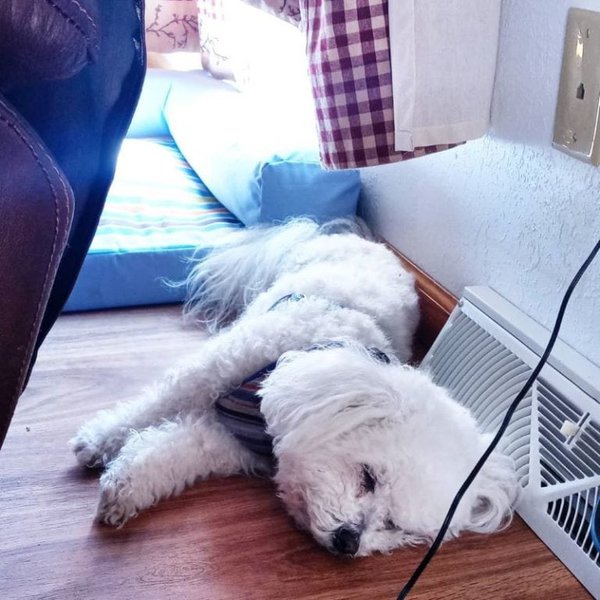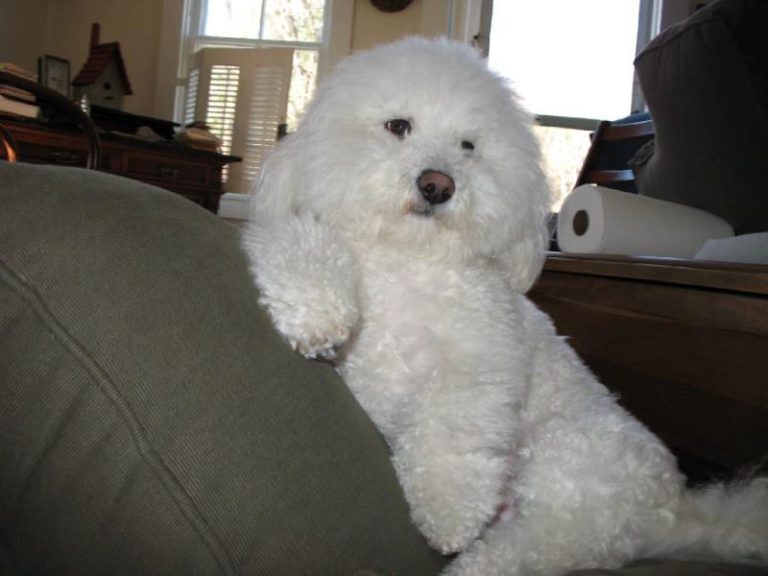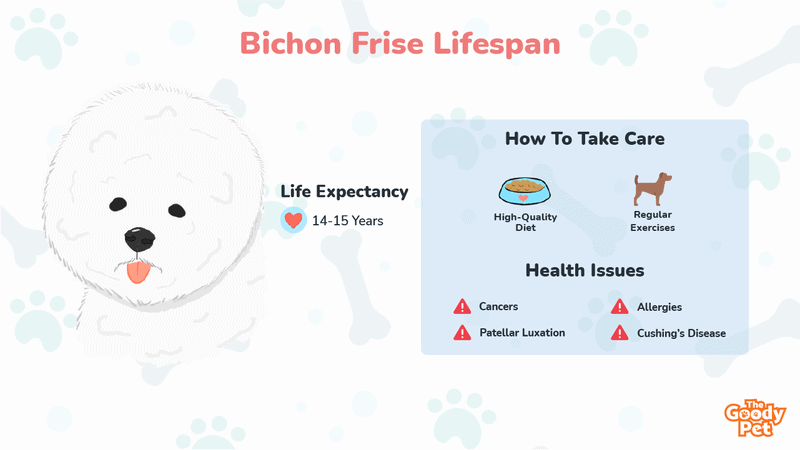Are you considering getting the all-white, gentle-mannered, and cheerful Bichon Frise as your pet? If that’s the case, it might be worth knowing more about its average lifespan. After all, smaller dogs tend to typically live longer when compared to larger ones.
So, how old does a Bichon Frise live? The Bichon Frise has a life expectancy of 14 to 15 years according to the American Kennel Club. Different accredited dog organizations will give the breed a lifespan of 12 to 16 years. Regardless of these minor differences, the fact remains that the Bichon Frise lives long.
Despite its long lifespan, a Bichon Frise can live for lesser years if they have serious health issues. This means that you need to take good care of your furry friend by giving high-quality food, regular good grooming, and ensuring the appropriate veterinary care.
We will give you details about all these issues, but first, here’s a quick overview of Bichon Frise’s life stages.
Bichon Frise Life Stages
Like all other dogs, the Bichon Frise’s life cycle is marked by four stages: puppy, adolescent, adult, and senior stage, each with specific characteristics and growth milestones.
The Puppy Stage (0 – 12 Weeks)
- In the first 8 weeks, the Bichon Frise puppy stays with the mother and the rest of the litter. The puppy is characterized by an expression of fear of the new mixed with a natural curiosity to discover the world around them. Week 8 is a good time to bring your little furry friend home.
- At around 12 to 16 weeks, there is more engagement with the family and this is a good time for plenty of training.
- There’s steady growth in height and weight.
The Adolescent Stage (16 Weeks – 8 Months)
- A sense of independence is marked by ignoring commands and instructions. The puppy will try dominance with other pets by growling and minor possessive behaviors. Obedience training is key.
- More prominent height and weight growth with more fat muscle build.
- Hormones-driven behavior; males will show more attention to females. The puppy will also roam away if left alone. Neutering/spaying should be done at this age.
The Adult Stage (8 – 14 Months)
- Fear of the new will manifest again and controlled socialization training should be done.
- Maximum height of 9.5 to 11.5 inches and weight range between 12 to 18 lbs are obtained.
The Senior Stage (15 Months And Beyond)
- The dog becomes more attached and loving and retains the playful nature of the puppy Bichon Frise.
- Regular exercise and mental stimulation should be ensured.
What Health Problems Do Bichon Frise Have?

The Bichon Frise is generally a healthy dog. But like all other dogs, they can be prone to some health problems. This is especially the case if you got your Bichon Frise from a breeder of disrepute or a rescue.
Mild health problems that affect the Bichon Frise include hip dysplasia, cataract, liver shunts, ear infections, diabetes, heart disease, and Legg-Calve-Perthes disease.
More serious conditions affecting the Bichon Frise dog breed include Cushing’s disease (hyperadrenocorticism), patellar luxation, and allergies.
Cushing’s Disease
Cushing’s disease results from the overproduction of the cortisol hormone and will cause symptoms such as a pot-bellied appearance, hair loss, increased appetite and drinking, and frequent urination. A study in 2016 found that the Bichon Frise was 6.5 times more prone to Cushing’s disease when compared with crossbreds.
Patellar Luxation
Patellar luxation is the dislocation of the kneecap. If your Bichon Frise has this condition, it will show abnormal movement with the hind limb, occasional skipping, and eventually become lame gradually or suddenly.
Allergies
Especially in the hot season, your furry friend might develop allergies because of the moist air. This will cause the dog to chew and scratch. Your Bichon Frise might also show allergies due to ticks, fleas, dust, and pollen.
Cancers
According to a UK purebred breed health survey, Bichon Frise will usually die from old age. Cancers of unspecified type come second among the leading causes of death in the breed.
To keep the health of your pup in check, it is important to carry out the health tests recommended by the Bichon Frise Club of America including Patella evaluation, Ophthalmologist evaluation, and hip evaluation. Regular vet visits are important for eye, ear, heart, and diabetes exams.
Temperament Of A Bichon Frise

Affectionate, playful, gentle, and bubbly are all traits that describe the pleasant happy-go-lucky temperament of the Bichon Frise.
Although this cheerful attitude is the breed standard of a Bichon Frise, you will need to initiate early obedience and socialization training if you want your dog to manifest these positive qualities.
If allowed to by the owner, this furry friend can become jealous of other pets, be territorial, and portray an attitude of independence.
Bred for a companion dog, this little furry friend will play willingly and enjoy cuddling with its owner. You will generally delight in its gentle manners. To use human qualities, the Bichon Frise is ‘a lady’ or ‘gentleman’ in their gentle manners.
Bichon Frise dogs are also sociable and will easily befriend children and other pets. They enjoy being the center of attention with their owner, but will also reciprocate by being charming with everyone including trainers, groomers, vets, and even strangers.
Like all other dogs, leaving your Bichon Frise alone will negatively affect their character. If left alone for too long, your little furry friend will suffer separation anxiety and manifest destructive behavior.
Loneliness can also cause your dog to bark excessively, even though the Bichon Frise is naturally a quiet breed. It is recommended that you don’t leave your dog alone for more than 8 hours.
But all this affection and responsiveness should not be mistaken for weakness. If you train them to, Bichon Frise can become good guard dogs and inform you any time a stranger approaches.
Grooming Tips For A Bichon Frise
Be ready to assume an additional grooming chore if you bring home a Bichon Frise. The dog’s double coat needs brushing daily or at least every week. This keeps shed fur caught in the undercoat from matting.
You can make fur grooming easier by using Ruff ‘n Ruffus Self-Cleaning Slicker Brush. This will brush your doggie’s fur down to the undercoat and de-mats any tangled hair. Once done, you simply press a button and the brush bristles retract to release the fur.
The Bichon Frise is hypoallergenic and is listed 4th among dog breeds that don’t shed. This means that you don’t have to deal with excessive fur around the house or the allergy-causing dander.
But your furry friend’s white coat can be prone to skin issues, and a good shampoo like the Wahl White Pear Brightening Shampoo for Pets is required. The shampoo has a coconut-derived sodding agent and a pear scent. It is also pH balanced and free of paraben and alcohol.
Professional grooming once every four to six weeks is recommended. This will give your pup the suggested once-a-month bath and a neat hair trim. Also, trim your dog’s nails regularly at home.
Regular teeth brushing, twice a week, will keep dental problems at bay and give your pet a clean and fresh mouth. Use a soft brush that’s designed for dogs and canine toothpaste. One that does not need rinsing like Petrodex Enzymatic Toothpaste for Dogs is ideal and will reduce tartar buildup and prevent plaque.
Healthy Diets For A Bichon Frise
Healthy living for the Bichon Frise has a lot to do with a healthy diet. High-quality dog food should be given twice daily. This could be commercially prepared or made at home. If you choose homemade food, consult with your Bichon Frise’s vet and be informed about human foods that are safe for dogs.
If you go for commercial dog food, choose a product that is made with natural ingredients like Hill’s Science Diet Dry Dog Food. The food is made from chicken, brown rice, and barley, and is enriched with minerals that promote strong and healthy bones in small-sized dogs. It also comes in small kibbles, fit for your pet’s tiny mouth.
Considering the Bichon Frise’s susceptibility to the patellar luxation condition discussed earlier, the eicosapentaenoic acid, or EPA, from fish oil, glucosamine, and chondroitin in Hill’s Science Diet will support healthy bones and cartilage for your little pup.
When training, use healthy training treats like the Zuke’s Natural Training Dog Treats. These mini treats have less than 3 calories per kibble and will not cause your furry friend any weight issues. Just be sure not to give too many.
Accompany high-quality dog food with a constant supply of fresh water. You can go for a dog crate water bottle like the Choco Nose H528 No Drip Rabbit Water Bottle which is specifically designed for small-sized dogs. The bottle can be fixed to the crate or screwed on wooden furniture to provide your pup with a freshwater supply throughout the day.
Related Questions
What Is The Oldest Bichon Frise? The oldest Bichon Frise in the UK according to the Observer is Nelly, at the time of writing, aged 20 years, since the referred news was in 2017 and no updates on Nelly are available. But the 18.5-year-old Sammi Calvetti was the oldest recorded Bichon Frise in the US by the time of death in February 2020.
Are Bichon Dogs Smart? According to the writer of ‘The intelligence of Dogs’, Stanley Coren, dogs have an instinctive adaptive, and working & obedience intelligence. As a companion dog, the Bichon Frise shines in adaptive intelligence for its ability to solve problems. Overall, Bichon Frise is assigned average intelligence and ranked 78th among 138 breeds.
Why Do Bichons Smell? Dog owners are divided about this question, but any dog will smell bad if left without grooming. Because of its furry double coat and susceptibility to skin allergies, the Bichon Frise needs regular grooming. Failure to groom will cause skin issues and your pet will smell and give your home an undesirable odor.





